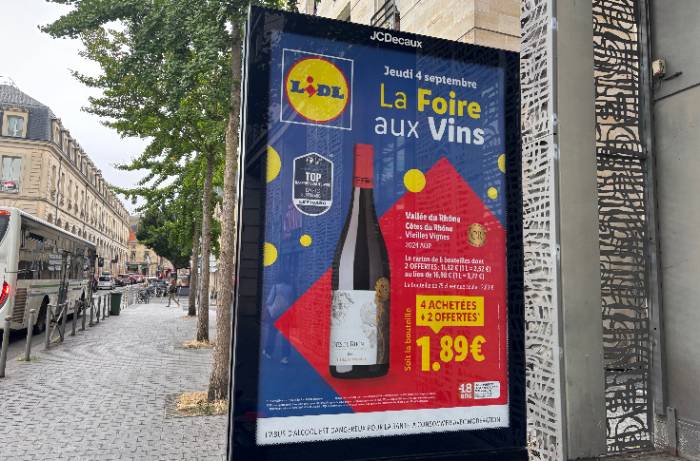
Lidl launched its annual autumn wine fair this Thursday, offering bottles at prices as low as €1.89, sparking outrage among French winemakers and industry leaders. The promotion comes at a time when the French wine sector is facing a severe crisis of overproduction, particularly in regions like Bordeaux, Languedoc-Roussillon, and the Rhône Valley. The supermarket chain’s catalog features more than 30 pages of discounted wines, including ten Bordeaux wines under €3, and similar deals on bottles from Gascogne, Loire, Alsace, Burgundy, Champagne, and Corsica.
The reaction from the wine community has been swift and critical. Gérard Bancillon, president of the Confédération des Vins à Indication Géographique Protégée (Vin IGP), condemned the campaign as “disgusting,” accusing Lidl of exploiting the distress of winemakers. He warned that such low prices damage not only the economic stability of producers but also the reputation and perceived value of French wines. Bancillon argued that consumers may come to believe it is possible to produce quality wines at these prices, when in reality these are often unsold stocks being liquidated below cost.
Damien Gilles, president of the Syndicat des Vignerons des Côtes du Rhône and head of the market commission at the Confédération Nationale des vins AOC (CNAOC), echoed these concerns. He described Lidl’s actions as a “betrayal” of the profession and said that no other retailer had dared to push prices so low. According to Gilles, Lidl purchased 20,000 hectoliters of Côtes-du-Rhône AOC wine at less than €90 per hectoliter—well below the production cost of €120 per hectoliter. He accused Lidl of undermining the market and worsening the situation for producers already struggling with falling demand.
Jérôme Despey, president of the wine council at FranceAgriMer and vice-president of the FNSEA farmers’ union, called for legislative action to prevent retailers from selling wine below production costs. He suggested adapting France’s Egalim law—which aims to ensure fair prices for farmers—to cover the wine sector specifically. Discussions are underway between industry groups and lawmakers to create a legal framework that would set minimum prices for wine sales.
Despite these calls for reform, many in the industry are frustrated by political delays. One wine merchant noted that while everyone is waiting for an updated Egalim law (“Egalim 4”), nothing has materialized due to ongoing political instability in France. The merchant pointed out that Lidl’s aggressive pricing is only possible because there is so much unsold stock in producers’ cellars—a symptom of declining wine consumption across France.
Lidl’s approach is not new but part of a broader strategy. This summer, similar promotions saw AOP Bordeaux red wines sold at €1.39 per bottle and rosé at €1.19. Other offers included Côtes-de-Provence rosé at €2.50 and IGP Pays d’Oc wines at €1.35 for both rosé and white varieties.
Jean-Marie Fabre, president of Vignerons Indépendants de France, criticized these “provocative entry-level prices,” saying they do not allow producers to cover their costs. He warned that winemakers are losing money every day by selling below cost and insisted that this situation cannot continue.
The controversy highlights deep tensions within the French wine industry as it grapples with overproduction, falling domestic consumption, and fierce competition from retailers seeking ever-lower prices. While Lidl maintains that good wine does not have to be expensive—a message prominently displayed in its promotional materials—many winemakers see these campaigns as a direct threat to their livelihoods and to the long-term reputation of French wine.
As discussions continue between industry groups and lawmakers about possible regulatory changes, winemakers remain concerned about their future. For now, Lidl’s autumn wine fair stands as a flashpoint in an ongoing debate over price, value, and sustainability in one of France’s most iconic industries.

Dining and Cooking